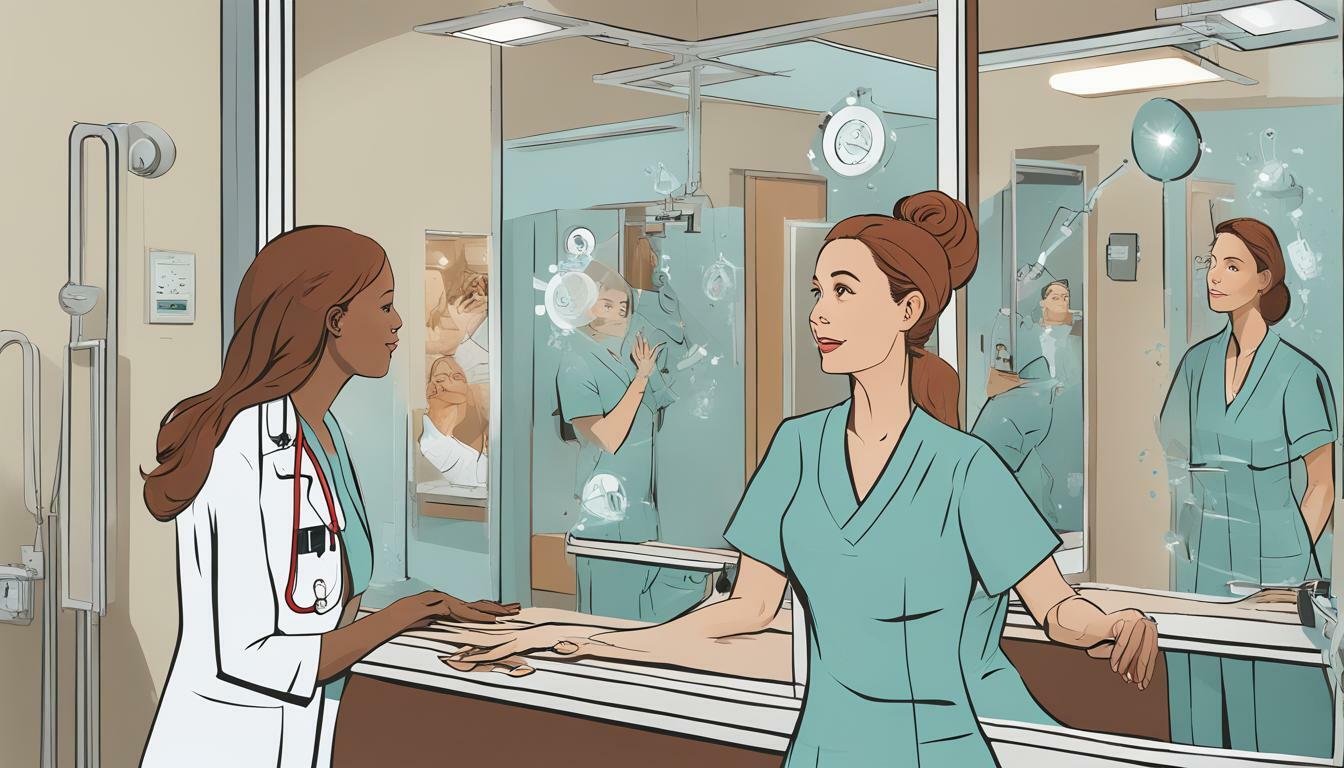
Self-awareness is a critical component of nursing practice. Nurses who possess self-awareness can better understand their own thought processes, emotions, and behaviors, which can lead to improved patient care and overall job satisfaction. In this article, we will explore the meaning and relevance of self-awareness in the nursing profession and provide practical strategies for nurses to develop and enhance their self-awareness skills.
Key Takeaways:
- Self-awareness is an essential skill for nurses that can improve patient care and job satisfaction.
- This article will explain the meaning and relevance of self-awareness in the nursing profession.
- We will provide practical strategies for nurses to develop and enhance their self-awareness skills.
Understanding Self Awareness in Nursing
Self-awareness is a critical component of the nursing profession that involves understanding one’s thoughts, emotions, and behaviors in response to different situations. It involves a deep understanding of one’s strengths, weaknesses, and personal biases that can affect one’s interactions with patients.
In order to enhance patient care and improve outcomes, nurses must possess a high level of self-awareness. This skill involves self-reflection and self-awareness evaluation, identifying areas for improvement, and seeking feedback from colleagues and patients.
Importance of Self Awareness in Nursing
Self-awareness in nursing is essential as it allows nurses to better understand and manage their emotions. It also helps them to develop empathy towards their patients, communicate more effectively, and make better decisions.
Through self-awareness, nurses can identify their biases and avoid projecting them onto their patients, which can lead to better patient outcomes and satisfaction. It also promotes self-care and helps nurses to avoid burnout and compassion fatigue.
In summary, understanding self-awareness in nursing is crucial for healthcare professionals to deliver the best possible care to their patients. By recognizing their own emotions, biases, and limitations, nurses can better connect with their patients and provide a higher level of care.
Developing Self Awareness in Nursing
Developing self-awareness is essential for anyone working in the healthcare industry. It enables nurses to understand their personality, emotions, values, beliefs, and attitudes, and how these factors can influence patient care. Self-awareness helps nurses to identify their strengths and weaknesses, enhance their communication skills, and build stronger relationships with patients and colleagues.
The following are strategies that nurses can use to develop self-awareness:
- Self-reflection: Taking time to reflect on one’s actions, thoughts, and feelings is an effective way to gain self-awareness. Nurses can ask questions such as, “What did I do well?” and “What could I have done differently?” to evaluate their performance and identify areas for improvement.
- Self-assessment: Nurses can use self-assessment tools such as personality tests, emotional intelligence assessments, and conflict management tests to gain insights into their personality, behavior, and emotional intelligence.
- Seeking feedback: Nurses can ask for feedback from patients, colleagues, and supervisors to understand how they are perceived and how they can improve their performance. Feedback can be obtained through formal channels such as performance reviews or informally by soliciting opinions or observations.
- Mindfulness practices: Mindfulness practices such as meditation, yoga, or breathing exercises can help nurses focus their attention on the present moment and increase self-awareness. These practices can improve nurses’ emotional regulation and reduce stress levels.
Developing self-awareness is a lifelong process that requires continuous effort and practice. By engaging in self-reflection, self-assessment, seeking feedback, and mindfulness practices, nurses can enhance their self-awareness skills and provide better patient care.
Self Awareness in Nursing Practice
Self-awareness plays a crucial role in nursing practice, impacting decision-making, communication, empathy, and self-care among nurses. By increasing their self-awareness, nurses can provide better care to their patients and improve their overall performance as healthcare professionals.
Research has shown that healthcare professionals who have higher levels of self-awareness are more likely to have better patient outcomes. They are more attuned to their patients’ needs and can tailor their approach accordingly, resulting in improved patient satisfaction and increased trust. Additionally, nurses who are self-aware are better equipped to identify their strengths and weaknesses, allowing them to seek further development and training to enhance their skills.
Self-awareness is also crucial for promoting teamwork among nurses. When nurses understand their own values, biases, and communication styles, they are better able to collaborate effectively with their colleagues. This leads to a more cohesive and efficient healthcare team, ultimately improving patient care.
| Benefits of Self Awareness in Nursing: |
|---|
| Improved decision-making: Self-awareness helps nurses make more informed and effective decisions, particularly in high-pressure situations. |
| Effective communication: Being self-aware allows nurses to understand their communication style, identify areas for improvement, and adapt to different patient needs and preferences. |
| Increased empathy: Self-aware nurses are better able to recognize and understand their patients’ emotions, leading to improved patient care and satisfaction. |
| Promoting self-care: Self-awareness helps nurses identify their own stressors and triggers, allowing them to prioritize their own well-being and avoid burnout. |
It is essential to promote self-awareness among healthcare professionals. By recognizing the importance of self-awareness in nursing practice, healthcare organizations can provide resources and support for nurses to develop their self-awareness skills continuously. This includes ongoing training and development opportunities, self-reflection exercises, and encouraging feedback from colleagues and patients.
Benefits of Self Awareness in Nursing
Self-awareness plays a critical role in enhancing nursing practice and improving patient care. By promoting self-awareness among healthcare professionals, nurses can experience a range of benefits that positively impact their performance and well-being.
Improved Patient Outcomes
Nurses who are self-aware are better equipped to make informed decisions during patient care. They can recognize their biases, emotions, and limitations, which allows them to provide more patient-centered care that is tailored to the individual needs of each patient. By taking a reflective approach to their practice, nurses can ensure they are providing the best possible care and achieving the best possible outcomes for their patients.
Enhanced Teamwork
Self-awareness contributes to better communication and collaboration among healthcare teams. When nurses have a greater understanding of their own strengths and weaknesses, they can more effectively work together with their colleagues to provide comprehensive care. This results in increased cohesion, trust, and mutual respect, leading to a more positive work environment for all.
Reduced Burnout
Nurses who prioritize self-awareness are more likely to recognize signs of burnout early on. By taking a proactive approach to their well-being, nurses can implement coping strategies and self-care techniques that promote resilience and prevent burnout. This results in a more sustainable work-life balance and ultimately supports longer-term job satisfaction in the nursing profession.
Increased Job Satisfaction
Finally, self-awareness is strongly associated with higher levels of job satisfaction among nurses. By gaining a deeper understanding of their own motivations and values, nurses can identify areas of work that align with their interests and passions. This leads to a more fulfilling career and an increased sense of purpose and accomplishment.
Overall, self-awareness is a critical component of nursing practice that benefits both patients and nurses alike. By prioritizing self-awareness development, nurses can enhance their performance, reduce burnout, and achieve greater job satisfaction.
Enhancing Self Awareness: Training for Nurses
Continuous training and development are essential for healthcare professionals to keep up with the ever-changing needs of patient care. Self-awareness training for nurses is an excellent way to enhance their skills and improve patient outcomes. These programs focus on cultivating self-reflection abilities, which can help nurses recognize their strengths and limitations, leading to better communication, empathy, and decision-making.
Nurses can take advantage of various self-awareness training programs available online or at local institutions. These programs teach self-reflection techniques and offer practical exercises for nurses to practice self-awareness in their daily work. Some training modules may include role-playing scenarios, peer-to-peer feedback sessions, and personality assessments, among others.
Professional development opportunities such as conferences, workshops, and seminars can also enhance nurses’ self-awareness skills. These events provide a platform for nurses to network with other professionals and learn from their experiences. They can also participate in training sessions that focus on mindfulness, self-care, and resilience, among other topics that promote self-awareness.
Moreover, healthcare institutions can support nurses’ self-awareness training by incorporating it into their staff development programs. Organizations can organize customized training programs for their staff that cater to their specific needs. They can also offer in-house training sessions and reward nurses who demonstrate exceptional self-awareness skills in their daily work.
Overall, self-awareness training is an excellent way for nurses to enhance their skills and become better healthcare professionals. It promotes lifelong learning, encourages self-reflection, and helps nurses provide better patient care. Therefore, nurses should take advantage of the various self-awareness training programs available and strive for continuous development in their practice.
Conclusion
Self-awareness is an essential aspect of the nursing profession that cannot be overlooked. As we have seen throughout this article, developing self-awareness skills can significantly impact the quality of care that patients receive.
By understanding the concept of self-awareness in nursing, strategies for developing self-awareness, and the various benefits that self-awareness can bring, nurses can enhance their performance and improve patient outcomes. Additionally, promoting self-awareness among healthcare professionals can lead to more effective teamwork, reduced burnout, and increased job satisfaction.
Continuous self-awareness development is critical for nurses, and there are various training programs and resources available to support their journey. As such, we urge nurses to prioritize their self-awareness journey, as it is crucial for the betterment of patient care.
FAQ
Q: What is self-awareness in nursing?
A: Self-awareness in nursing refers to the ability of nurses to recognize and understand their own thoughts, emotions, behaviors, and values. It involves being conscious of one’s strengths, weaknesses, beliefs, and biases, and how they may impact patient care.
Q: Why is self-awareness important in nursing?
A: Self-awareness is crucial in nursing as it helps nurses develop a deeper understanding of themselves, which in turn enhances their interactions with patients. It allows nurses to be more empathetic, communicate effectively, make better decisions, and provide holistic care.
Q: How can nurses develop self-awareness?
A: Nurses can develop self-awareness through self-reflection, self-assessment, seeking feedback from colleagues and patients, and engaging in continuous learning. Taking time for introspection, journaling, and participating in self-awareness training programs can also contribute to its development.
Q: How does self-awareness influence nursing practice?
A: Self-awareness positively impacts nursing practice by enabling nurses to make more informed decisions, improve communication and collaboration with colleagues and patients, demonstrate empathy, promote self-care, and maintain professional boundaries.
Q: What are the benefits of self-awareness in nursing?
A: Self-awareness in nursing leads to improved patient outcomes, enhanced teamwork and collaboration, reduced burnout, increased job satisfaction, and overall better quality of care. It also promotes personal growth and self-improvement for nurses.
Q: Are there self-awareness training programs for nurses?
A: Yes, there are several self-awareness training programs and resources available for nurses. These programs focus on enhancing self-awareness skills, emotional intelligence, mindfulness, and self-reflection. Nurses can engage in these training opportunities to further develop their self-awareness.
- Self Harm Awareness Ribbon Color: Unveiling Its Meaning - August 21, 2023
- What Is Emotional Self Awareness: A Guide to Inner Growth - August 21, 2023
- Self Harm Awareness Bracelets: Show Support and Share Hope - August 21, 2023

